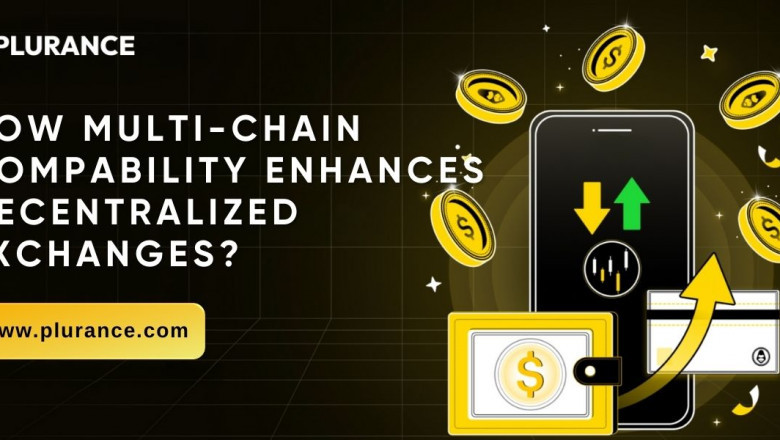views
The blockchain ecosystem is rapidly evolving, and decentralized exchanges (DEXs) have emerged as a cornerstone of this revolution. These platforms empower users to trade cryptocurrencies without intermediaries, ensuring privacy, transparency, and autonomy. However, as the number of blockchain networks grows, the need for multi-chain compatibility in decentralized exchanges has become paramount. This feature is not just a luxury; it is a necessity for staying competitive in the decentralized finance (DeFi) space. In this blog, we’ll explore how multi-chain compatibility enhances decentralized exchanges and why it’s a game-changer for the industry.
Understanding Decentralized Exchange Software
Decentralized exchange software refers to the technological framework that powers decentralized trading platforms. It is designed to facilitate the direct trading of digital assets between users without relying on a central authority. Built on blockchain technology and governed by smart contracts, this software ensures that transactions are secure, transparent, and automated.
Unlike centralized exchanges, decentralized exchange software enables users to retain full control of their private keys and assets, minimizing the risk of hacking or fraud. Key components of DEX software include liquidity pools, automated market makers (AMMs), cross-chain interoperability, and governance mechanisms. This innovative solution not only streamlines asset trading but also contributes to the growth of decentralized finance by promoting inclusivity and autonomy.
However, as decentralized exchange development advances, challenges like network congestion, high gas fees, and limited token availability on single-chain platforms have come to light. This is where multi-chain compatibility plays a transformative role.
What is Multi-Chain Compatibility?
Multi-chain compatibility refers to the ability of a decentralized exchange to operate seamlessly across multiple blockchain networks. Instead of being restricted to a single blockchain, multi-chain DEXs enable users to access and trade assets from different networks, such as Ethereum, Binance Smart Chain, Solana, Polygon, and more. This functionality is achieved through innovative solutions like cross-chain bridges and interoperability protocols.
How Multi-Chain Compatibility Enhances Decentralized Exchanges
1. Expanded Asset Availability
One of the most significant advantages of multi-chain compatibility is access to a broader range of assets. Traditional single-chain DEXs are limited to tokens native to their network, which restricts trading options. Multi-chain DEXs break these barriers, allowing users to trade assets from multiple blockchains, thereby enhancing the platform’s liquidity and user appeal.
2. Reduced Costs and Faster Transactions
Blockchain networks often experience congestion, leading to high transaction fees and slower processing times. Multi-chain decentralized exchange software can mitigate this issue by allowing users to execute trades on less congested networks with lower fees. This flexibility improves the overall user experience and makes DEXs more accessible to a wider audience.
3. Enhanced User Experience
With multi-chain compatibility, users no longer need to juggle multiple wallets or platforms to access different blockchain networks. A unified interface simplifies the trading process, making decentralized exchange platforms more user-friendly and efficient.
4. Increased Liquidity
Liquidity is a critical factor for the success of any DEX. Multi-chain decentralized exchange development facilitates access to liquidity pools across multiple networks, ensuring that users can execute trades without significant price slippage. This increased liquidity also attracts institutional investors and high-volume traders.
5. Future-Proofing the Platform
The blockchain landscape is continuously evolving, with new networks and protocols emerging regularly. Multi-chain compatibility ensures that decentralized exchanges remain adaptable and relevant, allowing them to integrate new networks as they gain popularity. This scalability future-proofs the platform against industry changes.
The Role of Decentralized Exchange Development
Building a multi-chain DEX requires expertise in decentralized exchange development. Developers must create secure and efficient cross-chain bridges, implement interoperability protocols, and design intuitive user interfaces. Additionally, ensuring the security of transactions across multiple networks is paramount to maintaining user trust. This level of complexity underscores the importance of choosing the right development partner.
Conclusion
Multi-chain compatibility is revolutionizing decentralized exchanges by expanding asset availability, reducing costs, enhancing user experience, and increasing liquidity. As the demand for seamless and efficient trading platforms grows, multi-chain DEXs are becoming the future of decentralized finance.
If you want to develop a decentralized crypto exchange with advanced multi-chain compatibility, Plurance is here to help. As a leading decentralized exchange software development company, Plurance specializes in creating secure, scalable, and feature-rich decentralized exchange software tailored to your needs. Contact Plurance today to turn your vision into reality and lead the DEX revolution with our decentralized exchange software development!!
For more info:
Call/Whatsapp - 91 8807211181
Mail - sales@plurance. com
Telegram - Pluranceteck
Skype - live:.cid.ff15f76b3b430ccc
Website - https://www.plurance.com/decentralized-exchange-development






















Comments
0 comment